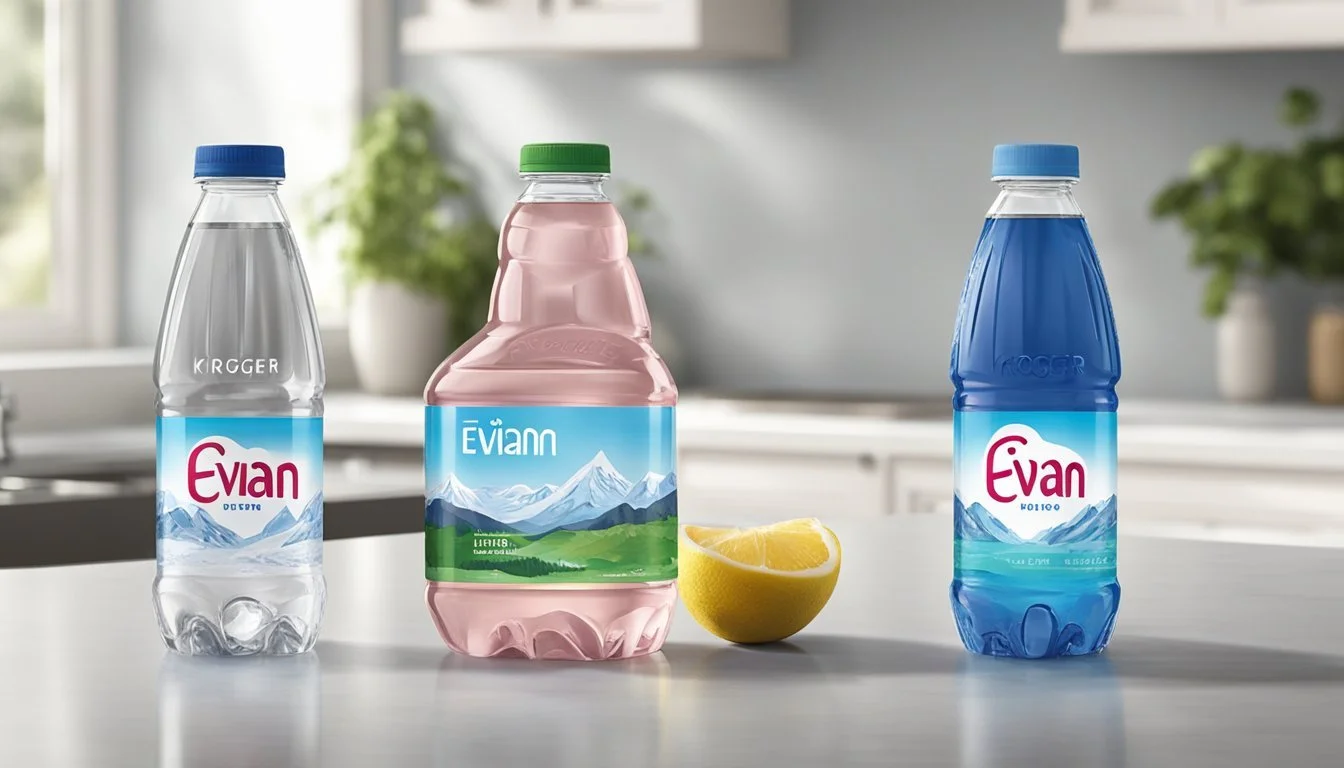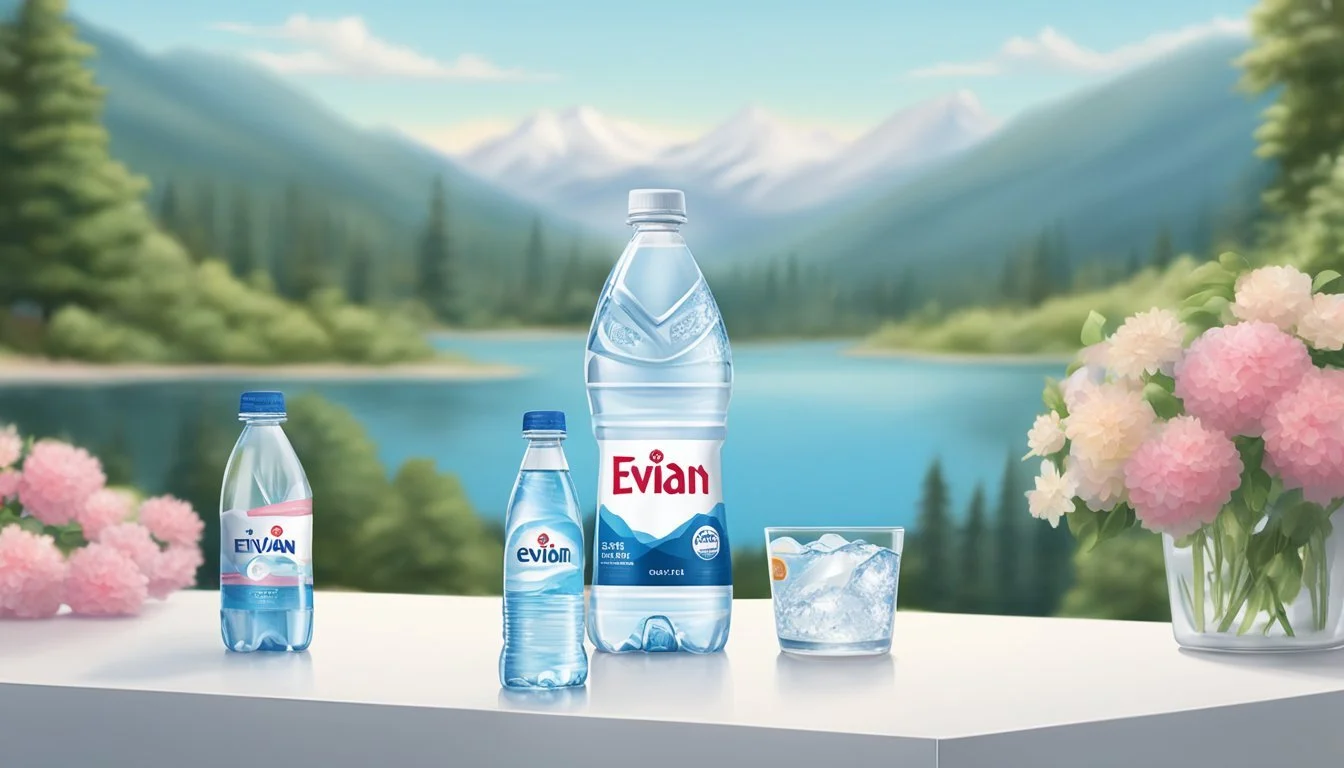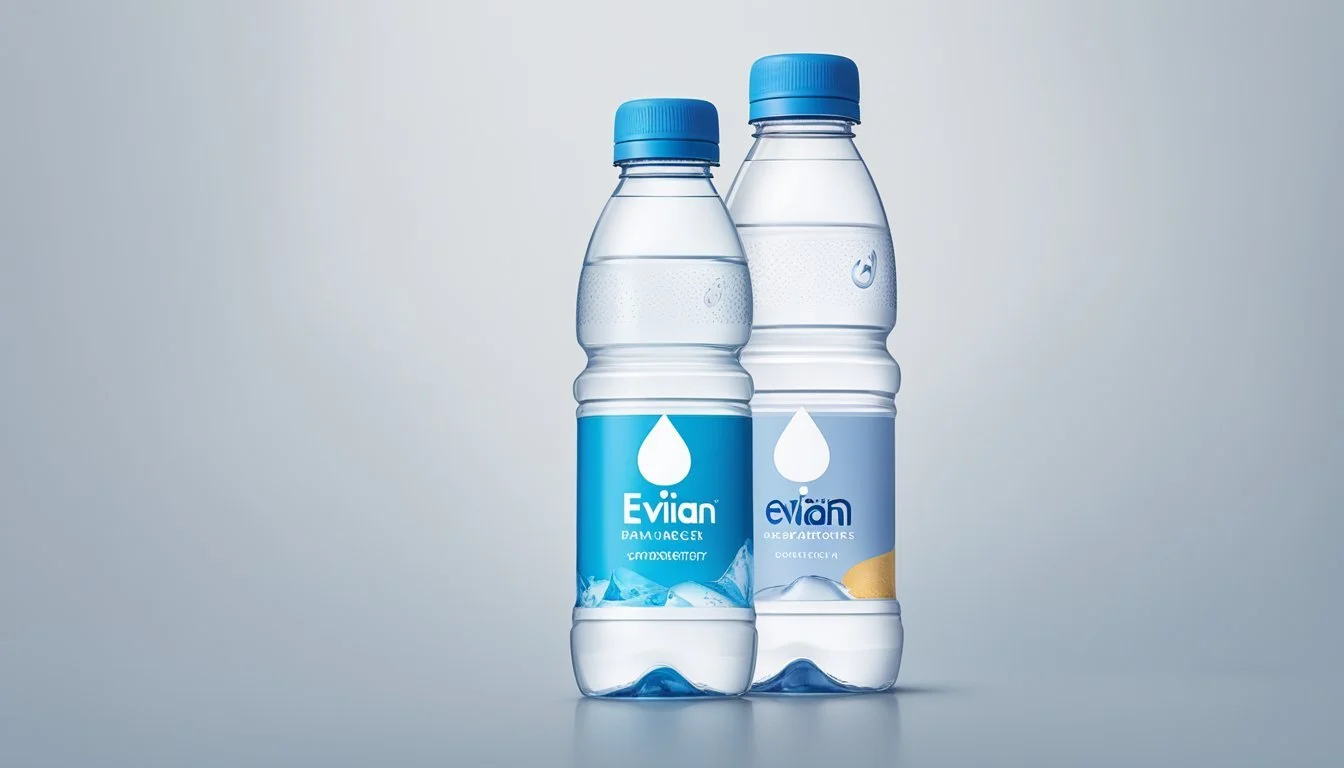Evian vs. Kroger
Comparing Bottled Water Quality and Taste
When choosing between Evian and Kroger bottled water, discerning consumers often look at key factors such as taste, source, and brand reputation. Evian, sourced from the French Alps, is known for its mineral-rich content and smooth taste, positioning it as a premium choice among bottled waters. Many prefer Evian for its refreshing, clean flavor and the perceived health benefits linked to its natural mineral content.
On the other hand, Kroger bottled water, known for its affordability, caters to those who prioritize cost-effectiveness. While it might not offer the same artisanal appeal as Evian, Kroger water generally meets the basic hydration needs without any notable drawbacks in taste or quality.
Ultimately, whether Evian or Kroger is the better choice depends largely on individual preferences and values. If you prioritize mineral content and a smooth taste, Evian may be worth the higher price. If affordability and basic hydration are your main concerns, Kroger bottled water stands as a practical option.
Understanding Bottled Water
Bottled water comes in various types, each adhering to specific regulations designed to ensure safety and quality. The health benefits and hydration aspects of bottled water make it a popular choice, though it’s essential to consider contaminants and environmental impacts.
Types of Bottled Water
Spring Water: Originates from underground formations and must flow naturally to the earth's surface. It retains the essential minerals present in the water source.
Mineral Water: Contains natural minerals and must be bottled at the source. The mineral content must remain constant and comply with the specific regulations of the country of origin.
Purified Water: Refers to water that has undergone processes like distillation, deionization, or reverse osmosis to remove impurities. Brands like Dasani utilize these methods to ensure a clean and refreshing taste.
Alkaline Water: Has a higher pH level than typical drinking water. Proponents believe it can neutralize acid in the body, though scientific consensus on health benefits varies.
Natural Artesian Water: Sourced from a confined aquifer. Evian, for instance, originates from the French Alps, providing a unique mineral balance through natural filtration.
Bottled Water Regulations
Regulatory bodies like the FDA in the United States enforce standards for bottled water, ensuring it is safe for consumption. The EPA regulates tap water, holding it to similar quality standards.
FDA Regulations:
Microbiological Safety: Limits on bacterial contaminants to prevent illness.
Chemical Safety: Limits on organic and inorganic chemicals such as lead and nitrates.
International Bottled Water Association: Provides guidelines that many companies follow voluntarily to ensure quality and safety.
Each regulation aims to maintain the safety and quality of bottled water, considering factors such as packaging safety and source protection.
Health and Hydration
Bottled water helps meet daily hydration needs, being a convenient and often tasty option. Hydration: Essential for maintaining various bodily functions, such as temperature regulation and joint lubrication.
Electrolytes: Some bottled waters contain added electrolytes like sodium and potassium, which are beneficial for people with high activity levels.
Minimal Contaminants: Quality bottled water usually has fewer contaminants compared to some tap water sources, depending on the local water supply conditions.
Concerns:
Microplastics: Recent concerns about microplastics in bottled water raise questions about long-term health impacts.
Environmental Impact: Despite the benefits, the environmental footprint of plastic bottles, including pollution and waste, remains a significant issue.
Bottled water, available in various forms, provides a reliable source of hydration and health benefits, though choices should be informed by awareness of regulations and potential contaminants.
Analyzing Evian and Kroger Water
Evian and Kroger water differ significantly in their sources, purification processes, and taste profiles. These factors can influence consumer preference based on specific needs and values.
Source and Origin
Evian: Sourced from natural springs in the French Alps, Evian is classified as natural spring water. The water travels through a lengthy geological process, slowly filtering through layers of glacial rock. This gives Evian its unique mineral content, including magnesium and bicarbonate, which is naturally balanced.
Kroger: Typically sourced from municipal supplies or underground aquifers, Kroger's water undergoes extensive processing to ensure safety and quality. It doesn't boast a unique geological origin like Evian, and its source can vary depending on regional bottling locations. The source details can usually be found on the product label.
Filtration and Purification
Evian: The water filtration process for Evian is minimal, capitalizing on its natural purity. It undergoes basic filtration to remove large particles, yet retains its natural mineral profile. Since it's bottled directly at the source, the need for artificial purification methods is limited, resulting in fewer interventions compared to other bottled waters.
Kroger: The Kroger brand uses multiple purification methods to ensure safety and compliance with FDA standards. These methods often include microfiltration, reverse osmosis, and ultraviolet light disinfection. This intensive process aims to remove impurities and contaminants, including microplastics and any potential municipal water additives.
Taste Profile and pH Levels
Evian: Known for a smooth, neutral taste, Evian's taste is often described as fresh and clean, owing to its natural mineral content. The pH level of Evian ranges between 7.2 and 7.9, which contributes to its slightly alkaline nature. This balance is appreciated by those who prefer a natural, unaltered water taste.
Kroger: The taste of Kroger bottled water can vary due to its diverse sources and intensive purification treatments. Generally, it is designed to have a clean, neutral taste. pH levels for Kroger water typically range from 6.5 to 7.5, making it closer to neutral or slightly acidic. This can impact its taste profile, especially for sensitive palates.
This thorough analysis highlights the unique characteristics of both Evian and Kroger bottled water, catering to varied consumer preferences based on their origin, purification process, and taste profile.
Packaging and Environmental Impact
Evian and Kroger bottled waters demonstrate key differences in bottle materials and their respective sustainability practices. These aspects significantly influence their convenience, environmental impact, and recycling potential.
Bottle Materials
Evian primarily uses PET plastic for its bottles. PET is lightweight and recyclable, contributing to convenience for consumers. Recently, Evian has increased its use of recycled PET (rPET), with an average of 44% rPET in their bottles, aiming for 100% by 2025. This shift reduces the need for virgin plastic and minimizes waste.
Kroger bottled water, on the other hand, also employs PET plastic. While information on the proportion of rPET in Kroger bottles is less detailed, many bottles are now BPA-free, addressing health concerns.
Sustainability Practices
Evian's sustainability efforts include a focus on reducing carbon emissions. For instance, recycled PET has approximately 30% lower emissions than virgin PET. Their broader sustainability strategy involves promoting a circular economy by enhancing recycling practices and reducing landfill waste.
Kroger's approach to sustainability includes adhering to FDA safety standards and efforts to reduce plastic waste. However, detailed initiatives comparable to Evian's extensive rPET usage are less documented. The environmental impact remains substantial due to the reliance on plastic, with microplastics and pollution being ongoing concerns.
Consumers looking for environmentally friendly options may find Evian's proactive measures more aligned with reducing their ecological footprint.
Safety and Quality Considerations
When comparing Evian and Kroger bottled water, it's crucial to examine their safety and quality. Both brands have distinct attributes that influence their overall trustworthiness and reputation.
Contaminant Levels
Evian sources its water from natural springs in the French Alps, ensuring minimal contact with pollutants. Tests typically show low levels of contaminants like lead, heavy metals, and arsenic. Evian water often contains naturally occurring fluoride within safe limits.
Kroger, on the other hand, adheres to strict FDA regulations. Nonetheless, concerns about contaminants such as microplastics and PFAS chemicals have been noted. These are especially relevant for non-carbonated water varieties. Kroger's use of BPA-free bottles reduces some health risks, but environmental factors affect quality too.
Quality Reporting
Evian provides detailed and accessible quality reports. These reports include data on mineral content, contaminant levels, and overall purity. The brand’s transparency with quality data helps establish consumer trust.
Kroger also publishes quality reports, though less detailed. These reports mainly confirm compliance with FDA standards. They often lack extensive information on specific contaminant levels, such as PFAS or heavy metals. However, Kroger’s adherence to safety standards still meets basic consumer safety expectations.
This direct approach ensures that consumers can make an informed decision about their bottled water choice, weighing both safety and quality considerations.
Comparative Analysis
Evian and Kroger bottled water differ significantly in terms of brand reputation, price, and value, influencing consumer choices. These distinctions are key to understanding the benefits and drawbacks of each option.
Popular Bottled Water Brands
Evian, sourced from the French Alps, is celebrated for its high mineral content and smooth taste. It's positioned as a luxury water brand, often featured in high-end venues. Consumers associate Evian with quality and natural purity. On the other hand, Kroger bottled water is a private label of the Kroger Company, appealing primarily to those seeking cost-effective solutions. While not regarded as premium, it adheres to FDA regulations, ensuring safety and quality.
Evian's market rivals include Fiji, Voss, and Smartwater, all known for their premium appeal. Meanwhile, Kroger competes with brands like Aquafina, Dasani, Nestlé Pure Life, and Costco's Kirkland. These competitors vary in source and taste, offering consumers a range of choices based on budget and preference.
Price Point and Value
Evian positions itself in the higher price bracket, reflecting its premium status and extensive branding efforts. The cost is justified for many by its natural source and mineral benefits. Prices can range from $1.50 to $2.50 per liter, depending on the retailer and region.
In contrast, Kroger bottled water is priced competitively, often less than $1 per liter, making it an attractive option for bulk purchases and everyday hydration needs. The value proposition here is more about affordability and accessibility rather than exclusivity or unique taste profiles.
While Evian’s premium pricing is suitable for those prioritizing quality and brand prestige, Kroger’s pricing appeals to cost-conscious consumers. Both brands fulfill their niches effectively, offering clear choices based on consumer priorities.
Consumer Considerations
When comparing Evian and Kroger bottled water, several factors influence consumer choice. These include taste preferences, health and lifestyle considerations, and the convenience and accessibility of each brand.
Taste Preferences
Taste is a primary factor for many water consumers. Evian is known for its distinct mineral profile, sourced from the French Alps. This results in a smooth, clean taste with subtle mineral notes. In contrast, Kroger's bottled water, often sourced from municipal supplies and processed through purification systems, tends to have a more neutral taste.
For those who enjoy a crisp, pure water flavor without any strong mineral notes, Kroger's might be more appealing. However, for consumers who prefer slightly mineralized water with a unique flavor, Evian is a favorite. Consumer preference varies greatly, making taste a subjective yet crucial element in choosing bottled water.
Health and Lifestyle
Health-conscious individuals often scrutinize bottled water for its health benefits. Evian prides itself on its natural mineral content, which includes calcium and magnesium, essential for the body. These minerals contribute to hydration and overall wellness. Kroger's water, being purified through reverse osmosis, may lack these natural minerals but ensures the absence of potential contaminants.
For people with active lifestyles who require consistent hydration, the presence of natural minerals in Evian may be attractive. Meanwhile, those concerned about purity and potential chemical contaminants might lean towards Kroger's offerings. When it comes to hydration and lifestyle, both brands serve different needs, reflecting market trends toward personal health and wellness.
Convenience and Accessibility
Convenience and accessibility also play significant roles in consumer decisions. Evian, an international brand, is widely available in supermarkets, specialty stores, and online. Its premium pricing reflects its status and source. Conversely, Kroger, a store-brand, is easily accessible in Kroger supermarkets and tends to be more budget-friendly.
Consumers who prioritize availability and cost-effectiveness might prefer Kroger, given its wide distribution and lower price point. Those looking for a prestigious brand with a unique source might favor Evian, despite its higher cost. Thus, the balance of convenience, accessibility, and price can significantly influence which water brand a consumer might choose.
The Bottom Line
When choosing between Evian and Kroger bottled water, consumers look at factors such as taste, source, and price.
Taste and Composition:
Evian: Known for its unique, mineral-rich taste due to its source in the French Alps.
Kroger: Offers a clean, neutral taste but lacks distinctive mineral components.
Source and Quality:
Evian: Sourced from the Cachat Spring in the French Alps. The water passes through geological layers that naturally filter and enhance it with minerals.
Kroger: Typically sourced from local municipal supplies and then filtered. It lacks the specific geological benefits of Evian.
Price Range:
Evian: Positioned as a premium brand, often priced higher due to its source and perceived luxury.
Kroger: More budget-friendly, making it accessible for everyday use.
Packaging:
Evian: Uses sleek, ergonomically designed bottles, often seen as more aesthetically pleasing.
Kroger: Standard packaging, functional but lacks the luxury appeal.
Availability:
Evian: Widely available in supermarkets, specialty stores, and online.
Kroger: Primarily available at Kroger stores and affiliated retailers.
In summary, Evian boasts a distinct taste and premium quality, while Kroger provides a practical and cost-effective option. The choice ultimately depends on what attributes the consumer values more: the luxury of Evian or the affordability of Kroger.
More About Evian
Evian vs Mountain Valley Spring Water: Which Bottled Water is Better?
Evian vs Richard's Rainwater: Which Bottled Water is Better?
Evian vs Whole Foods Italian Still Mineral water: Which Bottled Water is Better?






